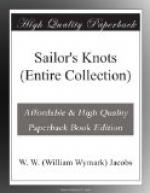He tore up twenty-three bits o’ paper all about the same size, and then with a black-lead pencil ’e put the numbers on, while everybody leaned over ‘im to see fair play. Then he twisted every bit o’ paper up and held them in his ’and.
“Is that satisfactory?” he ses.
“Couldn’t be fairer,” ses Bill Chambers.
“Mind,” ses Smith, putting them into a tall paper bag that had ’ad sugar in it and shaking them up, “Number I wins the prize. Who’s going to draw fust?”
All of ’em hung back and looked at each other; they all seemed to think they’d ’ave a better chance when there wasn’t so many numbers left in the bag.
“Come on,” ses Smith, the landlord. “Some-body must be fust.”
“Go on, George Kettle,” ses Bob Pretty. “You’re sure to win. I ’ad a dream you did.”
“Go on yourself,” ses George.
“I never ’ave no luck,” ses Bob; “but if Henery Walker will draw fust, I’ll draw second. Somebody must begin.”
“O’ course they must,” ses Henery, “and if you’re so anxious why don’t you ’ave fust try?”
Bob Pretty tried to laugh it off, but they wouldn’t ’ave it, and at last he takes out a pocket-’andkerchief and offers it to Smith, the landlord.
“All right, I’ll go fust if you’ll blindfold me,” he ses.
“There ain’t no need for that, Bob,” ses Mr. Smith. “You can’t see in the bag, and even if you could it wouldn’t help you.”
“Never mind; you blindfold me,” ses Bob; “it’ll set a good example to the others.”
Smith did it at last, and when Bob Pretty put his ’and in the bag and pulled out a paper you might ha’ heard a pin drop.
“Open it and see what number it is, Mr. Smith,” ses Bob Pretty. “Twenty-three, I expect; I never ’ave no luck.”
Smith rolled out the paper, and then ’e turned pale and ’is eyes seemed to stick right out of his ’ead.
“He’s won it!” he ses, in a choky voice. “It’s Number I. Bob Pretty ’as won the prize.”
[Illustration: “He’s won it!” he ses, in a choky voice. “It’s Number I.”]
You never ’eard such a noise in this ’ere public-’ouse afore or since; everybody shouting their ’ardest, and Bill Chambers stamping up and down the room as if he’d gone right out of his mind.
“Silence!” ses Mr. Smith, at last. “Silence! How dare you make that noise in my ’ouse, giving it a bad name? Bob Pretty ’as won it fair and square. Nothing could ha’ been fairer. You ought to be ashamed o’ yourselves.”
Bob Pretty wouldn’t believe it at fust. He said that Smith was making game of ’im, and, when Smith held the paper under ’is nose, he kept the handkerchief on his eyes and wouldn’t look at it.
“I’ve seen you afore to-day,” he says, nodding his ’ead. “I like a joke as well as anybody, but it ain’t fair to try and make fun of a pore, ’ard-working man like that.”
I never see a man so astonished in my life as Bob Pretty was, when ’e found out it was really true. He seemed fair ’mazed-like, and stood there scratching his ’ead, as if he didn’t know where ’e was. He come round at last, arter a pint o’ beer that Smith ’ad stood ’im, and then he made a little speech, thanking Smith for the fair way he ’ad acted, and took up the hamper.




